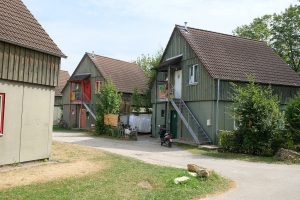1:32 min., video from 15.01.2021
Keywords: DE-News, Movies, Movies < 4 Min, Wood construction, Climate protection, Certification & Labels
1:32 min., video from 15.01.2021
Since 17 December 2019, the "Competence Centre for Sustainable Procurement and Awarding" (KNBV) has been supporting municipalities and other public administration bodies in Schleswig-Holstein in taking sustainability into account. The tasks range from paperless procurement processes and PVC-free office supplies to electric service vehicles including a charging station concept or sustainable services such as plastic-free, fair and regional catering. The KNBV provides advice, information and support on all questions relating to these processes, products or committee and public relations work. Interested municipalities and other public administration bodies will find competent answers for concrete projects as well as a wide range of training courses and events.
State Secretary for Finance Dr. Silke Schneider explained: "Especially in public administration, resource protection and sustainability play a central role. In this respect, the Competence Centre is an important partner for the municipalities. In this centre, we bundle expertise and practical support in the challenge of procuring sustainable products economically as well."
State Secretary for the Environment Dr. Dorit Kuhnt said: "The federal and state governments are committed to the Global Sustainability Goals. In this context, the state is creating the best conditions for a more sustainable administration at all levels with this service offer for municipalities. In doing so, the competence centre is intended to make it easier for those responsible to be transparent and thus make better decisions."
In future, the tasks of the KNBV will include a.o.:
Also:
The competence centre, based in Kiel, is initially limited until the end of 2021.
Further information
www.knbv.de
Keywords:
Stakeholders, Building materials / Construction, Greening / climate adaptation, Procurement, Soil & land consumption, DE-News, Renewable, Fair trade, Climate protection, News Blog Schleswig-Holstein, Resource efficiency, SDG 2030, Environmental policy
 On the one hand, more and more old office buildings and office parks are losing their function. On the other hand, there is a great demand for living space in cities and agglomerations. This publication shows the opportunities, but also the difficulties, associated with the conversion of this particular building typology.
On the one hand, more and more old office buildings and office parks are losing their function. On the other hand, there is a great demand for living space in cities and agglomerations. This publication shows the opportunities, but also the difficulties, associated with the conversion of this particular building typology.
The conversion of office properties certainly represents only a very small and special segment of our urban development. But it deserves more attention, both in terms of the history behind this inconspicuous building task and in terms of the future potential that we are far from having exhausted. The conversion of this particular building stock is a serious alternative to demolition and new construction.
Seven practical examples show how diverse and varied office building conversion projects are. From historic individual properties to modern office districts, the framework conditions are often very different. However, it is precisely by dealing with the existing buildings that they can develop new qualities for their surroundings (Lyoner Viertel, Frankfurt; Büropark Seestern, Düsseldorf; O-Werk, Bochum; Goltsteinforum, Cologne; Beginenhof, Essen; Gerling Hochhaus, Cologne; Hochhaus an der Baierbrunner Straße, Munich).
The study commissioned by StadtBauKultur NRW was prepared in cooperation with the ILS - Institute for Regional and Urban Development Research.
Here you can download or order the publication:
www.stadtbaukultur.nrw.de/...
Keywords:
New books and studies
 A big thank you to Mr Pohlmeyer for the current photos of the small "Cube settlement".
A big thank you to Mr Pohlmeyer for the current photos of the small "Cube settlement".
To the Photo gallery 9/2016
Keywords:
Wood construction, News Blog Baden-Württemberg, Settlements, Residential, sdg21 news
To mark the 10th anniversary in 2008, a 35-minute film was made about the GWL-Terrein showcase project in Amsterdam-Westerpark (language: Dutch with English subtitles):
More films about the car-free neighbourhood:
https://gwl-terrein.nl/bezoekers/gwl-10-jaar-de-geboorte-van-een-eco-wijk/milieuvriendelijk-wonen-midden-in-amsterdam-bouwfilm-uit-1997/
Keywords:
Car Free, News Blog Europe (without DE), News Blog Netherlands, Quarters, Settlements